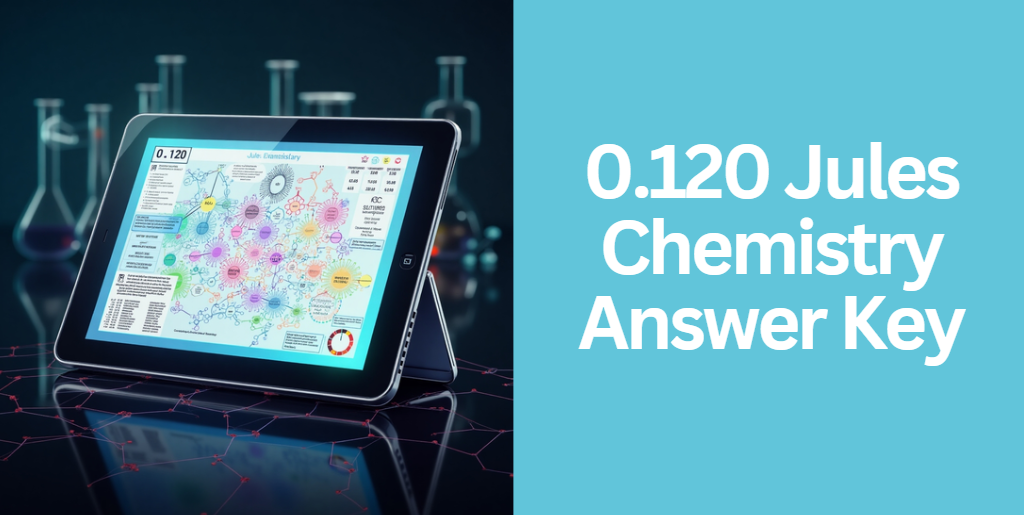Comprehensive Guide on 0.120 Jules Chemistry Answer Key
The 0.120 Jules Chemistry Answer Key serves as a critical resource for students who are preparing for competitive exams. It offers a clear outline of the correct answers for multiple question formats and is essential for evaluating performance and fine-tuning study strategies. This article explores the answer key in depth, offering context, comprehensive breakdowns, and actionable advice that can help you maximize your potential on exam day.
In this guide, you will learn about the purpose of the answer key, its detailed structure, and how to use it effectively. By following the expert insights and detailed analysis provided here, students can navigate the complexities of the exam with increased confidence and clarity.
Background and Context
Before diving into the specifics of the 0.120 Jules Chemistry Answer Key, it is important to understand the exam context in which it is used. The answer key is associated with a highly competitive exam format that includes Multiple Choice Questions (MCQs), Multiple Select Questions (MSQs), and Numerical Answer Type (NAT) questions. These formats are carefully designed to assess a wide range of knowledge and analytical skills.
The answer key is provisional, meaning that while it provides the correct responses based on expert judgment, it is open to review and challenges if discrepancies are identified. This provisional status underlines the importance of staying updated and verifying any changes made by the exam authorities. Historical trends show that answer keys evolve over time, reflecting new patterns in question setting and assessment strategies.
Detailed Breakdown of the Answer Key
Multiple Choice Questions (MCQ)
The first section of the 0.120 Jules Chemistry Answer Key is dedicated to MCQs. Each question in this section is designed to test a specific concept or application within the subject. The answer key lists each question with the correct option(s) and the marks allocated, which generally range from one to two marks.
Consider the following table that illustrates a simplified breakdown of the MCQ section:
| Question Number | Answer | Marks |
|---|---|---|
| 1 | A B | 1 |
| 2 | A C | 1 |
| 3 | A A | 1 |
| … | … | … |
This table helps students visualize the structure and understand the marking scheme. Each entry in the answer key is a step toward mastering the exam’s format.
Multiple Select Questions (MSQ)
The MSQ section involves questions where more than one option may be correct. Unlike MCQs, these questions require you to choose all correct answers from a set of possibilities. The 0.120 Jules Chemistry Answer Key provides the correct combinations for each question, which is essential for preventing partial credit issues during scoring.
For example, a typical MSQ entry might look like this:
- Question 31: Correct answers – A, B, C (2 marks).
Using a list format, the key breaks down the answer selection to show clearly which options are correct. This clarity aids students in comprehending the required response structure and in recognizing common patterns within the exam.
Numerical Answer Type (NAT)
The NAT section of the answer key includes questions that require numerical responses. These questions often have an acceptable range to accommodate minor calculation differences. For instance, an answer might be accepted if it falls within a narrow range (e.g., 28.082 to 28.089). Understanding these ranges is crucial because even a small error in calculation could result in losing marks.
Here’s a sample format for the NAT section:
| Question Number | Accepted Range | Marks |
|---|---|---|
| 41 | 2 to 2 | 1 |
| 42 | 3 to 3 | 1 |
| 43 | 60 to 60 | 1 |
| … | … | … |
This detailed breakdown ensures that students are aware of the precision required and helps them prepare accordingly.
How to Effectively Use the Answer Key
Using the 0.120 Jules Chemistry Answer Key effectively can significantly enhance your study routine. Start by cross-referencing the answers provided with your own solutions to understand any discrepancies. This self-assessment method is valuable in identifying weak areas and reinforcing learning.
A step-by-step approach might include:
- Reviewing Each Section: Begin with the MCQ section, move to the MSQ, and then tackle the NAT section.
- Integrating with Your Study Plan: Use the answer key as a benchmark during revision sessions. Compare your responses and take note of common errors.
- Regular Practice: Consistent practice using previous exam papers and the answer key will build confidence and proficiency.
In addition to these steps, consider forming study groups where students can discuss and challenge each other’s understanding of the answer key. This peer review process often reveals insights that may not be obvious when studying alone.
Expert Analysis and Insights
A detailed analysis of the 0.120 Jules Chemistry Answer Key reveals several trends in question patterns and answer distribution. Expert educators suggest that the answer key not only tests factual knowledge but also the application of theoretical concepts under timed conditions.
When comparing this guide with other available resources, it stands out because of its structured breakdown, detailed explanations, and actionable study tips. Some key insights include:
- Understanding Answer Patterns: Recognizing why certain answers are correct can deepen your comprehension of the subject.
- Strategic Exam Preparation: Integrating the answer key into your revision routine can help prioritize topics that are frequently tested.
- Overcoming Common Pitfalls: Identifying recurring mistakes through analysis of the answer key ensures you avoid similar errors in future attempts.
This guide provides a comparative analysis that not only explains the answer key but also offers strategic insights for a more effective exam preparation plan.
Additional Resources and Further Reading
For further enhancement of your study process, consider exploring these additional resources:
- Official Exam Resources: Check out the official exam website for the latest announcements and detailed guidelines.
- Supplementary Study Materials: Refer to textbooks, online courses, and video tutorials that cover the topics in the exam.
- Peer Discussion Forums: Engage with other students in online forums to exchange insights and clarify doubts.
A comprehensive list of these resources is available in a table format below:
| Resource Type | Description | Link/Source |
|---|---|---|
| Official Exam Website | Latest updates and detailed exam guidelines | [Exam Authority Website] |
| Online Courses | Subject-specific courses to boost understanding | [Popular E-learning Site] |
| Video Tutorials | Step-by-step explanations of difficult topics | [YouTube/Online Platform] |
| Peer Forums | Discussion groups for exam preparation | [Educational Forums] |
FAQs
What measures are taken to protect the integrity and confidentiality of the answer key?
Secure distribution methods and strict access controls are implemented to protect the answer key from unauthorized modifications or leaks. These measures ensure that only verified candidates and educational professionals have access, preserving the document’s integrity and reliability.
How can students confirm the authenticity of the answer key?
Students can cross-reference the details provided in the 0.120 Jules Chemistry Answer Key with announcements from official exam authorities or educational institutions. Verifying through multiple trusted sources helps ensure that the answer key is accurate and current.
What platforms or digital technologies are used to distribute the answer key?
The answer key is typically made available through secure educational portals and official exam websites. This distribution method ensures that students can access the latest version quickly and safely without encountering outdated or tampered content.
How does the answer key contribute to long-term academic growth beyond exam preparation?
By studying the answer key, students not only prepare for exams but also gain insights into standardized testing methodologies and assessment strategies. This analytical approach can foster critical thinking skills and provide a better understanding of how academic performance is evaluated in competitive environments.
Is it possible to adapt the insights from the answer key for subjects other than chemistry?
While the 0.120 Jules Chemistry Answer Key is specifically designed for a chemistry exam, the analytical techniques used to interpret the answers—such as understanding question patterns and strategic problem solving—can be applied to other subjects. This cross-disciplinary skill set can enhance overall academic performance.
Conclusion
In summary, this comprehensive guide on the 0.120 Jules Chemistry Answer Key is designed to be your ultimate resource for exam preparation. By breaking down the answer key into clear sections, offering expert insights, and providing actionable tips, this guide aims to enhance your understanding and performance.
Whether you are reviewing MCQs, MSQs, or NAT questions, integrating this guide into your study routine will help you approach your exam with confidence. The detailed breakdowns, along with practical recommendations and additional resources, ensure that you have all the information you need to succeed.
Embrace this guide as a reliable companion in your journey toward exam success and let it be the cornerstone of your study strategy.
More Posts
Sony FL201 1 517 141 11 Replacement Parts USA – The Ultimate Comprehensive Guide
Ultimate Guide to LM7 Upgrading To 1 Cable Alternator
Comprehensive Guide to the Ardwolf 2-In-1 Smoke And Co Detector





